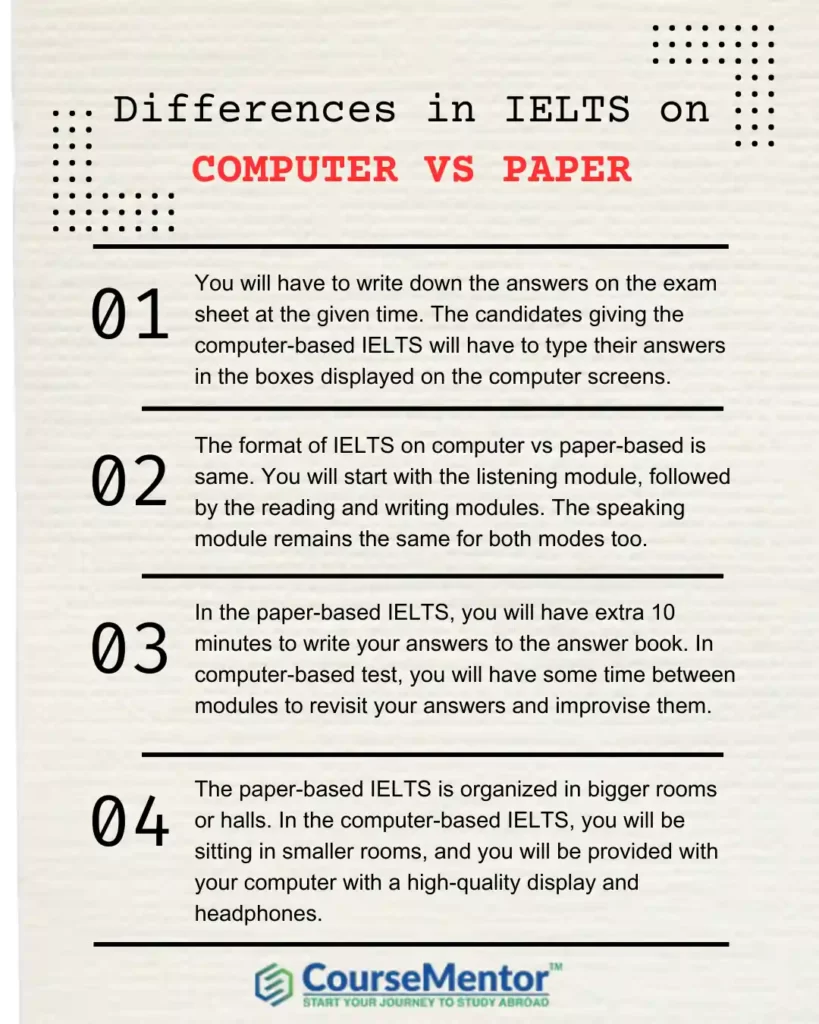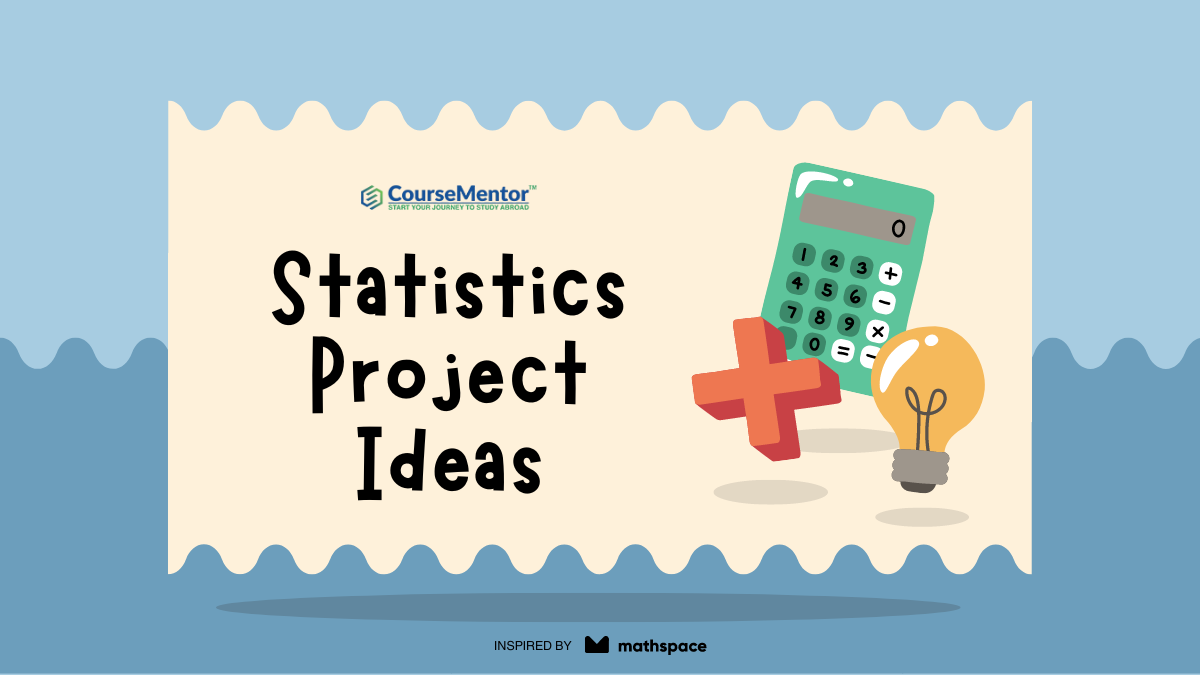If you are aspiring to study in the US, Canada, Australia, the UK, or any other English-native country, then you will have to give an English proficiency test to prove that you are capable of understanding English.
There are various English proficiency tests available, like the IELTS, TOEFL, PTE, and the Duolingo test for English.
The International English testing system (IELTS) is one of the most popular English testing exams. Indian students have trusted IELTS because of its feasibility and simple format.
You can give any other test as well if your university accepts it. The format of IELTS is pretty basic, and it tests your English in 4 modules: Reading, Writing, Speaking, and Listening.
These all modules are specially designed to test different skills of English. The IELTS is available as a computer-based test and a pen-paper-based test.
In this blog, I will give you clarity on IELTS on computer vs paper: Which should you choose?
IELTS on computer vs paper
There are many things that students must know about to get clarity on IELTS computer and IELTS pen-paper.
I will throw light on both types of IELTS exams that will help you choose one IELTS exam.
So, without wasting any more time, let’s get started!
What is computer-based and paper-based IELTS?
Students can choose to give the test in either of the modes. However, students are often confused regarding IELTS on computer vs paper.
The paper-based IELTS requires you to answer reading, writing, and listening modules on the examination paper, and the IELTS speaking section is taken by an examiner via face-to-face interview.
In the computer-based IELTS, you will be giving answers to writing, reading, and listening modules on the computer, and the speaking section is still to be given to a trained IELTS examiner as an interview.
Listening, reading, and writing modules of the IELTS on paper and computer are completed on the same day, but the speaking module in both modes takes place on a different date.
You can choose to give the speaking test before or after the test of other modules.
Differences in IELTS on computer vs paper

- You will get the examination paper and a pencil for the paper-based IELTS. You will have to write down the answers on the exam sheet at the given time. The candidates giving the computer-based IELTS will have to type their answers in the boxes displayed on the computer screens. You need to have basic typing knowledge to appear on the computer-based IELTS.
- The format or pattern of IELTS on computer vs paper-based remains the same. You will start with the listening module, followed by the reading and writing modules. The speaking module remains the same for both modes too.
- In the paper-based IELTS, you will be required to hear the recordings first and then write the answers in your question booklet, and then at the end of the listening section, you will have 10 more minutes to copy down the questions to the answer book. In the computer-based test, you will have some time between modules to revisit your answers and improvise them. This is one of the most important points in IELTS on computer vs paper.
- The paper-based IELTS is organized in bigger rooms or halls, and you will be sitting with multiple students giving the exams. These are mostly exam centers, universities, or other institutions. In the computer-based IELTS, you will be sitting in smaller rooms, and you will be provided with your computer with a high-quality display and headphones.
After learning about the differences between IELTS on computer vs paper, you must know the advantages and disadvantages of both modes of the exam.
Advantages of Computer-based IELTS
- Smaller rooms and fewer candidates help you to lessen your exam anxiety, and you can go through the checking protocols faster. You will also be able to concentrate on your exam better. Many students get overwhelmed by the number of students and examiners in the paper-based test, which leads to low scores.
- Results of the computer-based IELTS are obtained in 5-7 days, which is quicker than paper-based IELTS. This is one of the biggest advantages of computer-based IELTS.
- In the IELTS writing module, you will be asked to write a certain number of words in the essay. For example, you need to write around 250 words in IELTS writing task 2. In this computer-based test, there will be a visible word counter on the screen, so you do not need to count the words manually.
- Many students face time management issues while appearing for IELTS. In the computer-based IELTS, the timer on your screen will turn red when you have 10 minutes left for the reading section and when you have 5 minutes left for the writing section. This will help you to manage your time effectively.
- If you give the computer-based IELTS, you need not worry about your handwriting. Most students are worried about their handwriting on paper-based tests and end up taking more time to write in a presentable way.
- You can edit any of your answers conveniently. In the paper-based test, if you want to edit your answer, you will need to cut the existing words, which will give a bad presentation.
- Students are confused about whether they can highlight the important points of their answers in the computer-based test. You can highlight any part of your answer with a right-click in the reading and listening modules.
- Another important advantage of computer-based IELTS is that you can change the text color and the size of your font in the computer-based IELTS.
- The computer-based test also offers you a navigation bar on the screen where you can track your exam progress. You can see if you have any of your questions left out or track how many are still left.
- If you are doubtful about an answer and you wish to review it later, then in this also computer-based IELTS gives you an upper hand. You can highlight the number of questions that you want to review, and the navigation bar will show it constantly, and you will be reminded of that.
Disadvantages of Computer-based IELTS
- If you are not used to sitting in front of a screen for too long, then this might be stressful for you. The IELTS is of 3 hours roughly. You may get stressed, or your eyes may experience some pain by sitting in front of the screen for too long.
- If you are taking the computer-based IELTS, then it can be unfruitful to you if you do not have basic computer skills like scrolling, clicking, navigation, clearing, highlighting, copying and pasting, dragging and typing, etc. You can learn these skills, but it is better to opt for paper-based if you have no experience in this.
- If you are not used to computers before, then understanding the navigation, typing, and other things might take up your time, which can cause you to lose your marks.
- There will be other candidates with you in the room, so you might hear a lot of keyboard noises constantly, which can distract you. Some centers offer noise-cancellation headphones, but if your center doesn’t have one, then it might be a problem.
Advantages of Paper-based IELTS
- The paper-based IELTS is the traditional way of writing the exam, so if you are someone who has beautiful handwriting and presentation skills, then paper-based IELTS might be useful to you.
- In pen-paper-based IELTS, the presentation of your answer sheet matters. You may want to underline some points in your answer. To underline a point in computer-based IELTS, you will have to click on the mouse and select the highlight option, this might consume your time. In paper-based IELTS, you can easily underline with your hand, which takes less time.
- Your speed will be good as you will be more used to writing an exam on paper. You also need not possess any computer skills to take the paper-based test. You can write quickly with your hands, which you are used to.
- Probably the biggest advantage of writing the IELTS in paper-based mode is that you will get 10 minutes extra after the listening module. These 10 minutes are for you to copy your answer to the answer book.
Disadvantages of Paper-based IELTS
- In the writing section, where you need to be precise about the number of words, you will have to count the number manually, which will be time-consuming as well as inaccurate. You may get confused if you should count a number as a word or not, and many other confusions like this.
- You cannot track your progress right away. You will not know how many questions you want to review again. This might leave you with some unanswered and unreviewed questions.
- The result will take longer compared to IELTS computer-based. Your result will be declared on the 13th day of the IELTS listening, reading, and writing modules. This can create problems with strict university deadlines.
- You will also face a deduction of marks if your handwriting is not clear. You also cannot edit or remove a word without making your answer sheet look bad.
Conclusion
The IELTS can be given in computer-based or paper-based mode. This option enables the candidate to choose what is right for them.
If you are familiar with typing quickly, then the computer-based test might be the best option for you.
If you do not have regular practice typing and good handwriting, then I will suggest you go with the paper-based IELTS.
Remember that the format and the questions in both formats remain the same, the only difference is the mode of the exam.
If you are good with basic computer skills, then the computer-based option is the best as it has many facilities like navigation, tracking progress, word count, etc.
You should first analyze the advantages and disadvantages of IELTS on computer vs paper and then decide which is the best for you.
I hope this blog has cleared all your queries and questions about computer-based IELTS and pen-paper-based IELTS.
If you still have any questions related to this, don’t hesitate to contact our experts or let us know through comments.
Keep visiting CourseMentor™ for more interesting and informative content like IELTS on computer vs paper.
FAQs
What is the exam registration fee for IELTS on computer and paper?
The exam registration fee for both modes of the IELTS test is the same. Students have to pay a fee of INR 16,250 in advance to take the exam. They can select the mode while registering for the exam.
Is 1 month enough for IELTS?
The answer to this question may vary from person to person. If a student has a strong base of English, then he or she can easily prepare for the IELTS within a month otherwise, it can take 3 to 4 months to prepare for the exam.





